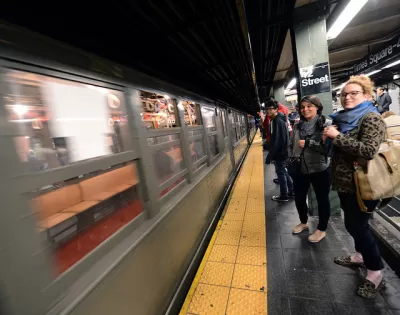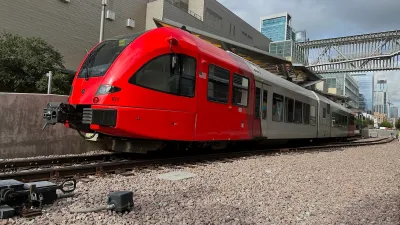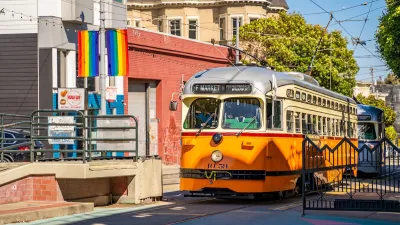One writer argues that improving transit in major cities would boost local economies and prove that positive change is possible.

Writing in Governing, Aaron M. Renn lays out an argument for prioritizing public transit reform in big cities. “Not only is it a genuinely critical need, but it’s an area where tangible progress can be made and the public will see it right away,” Renn writes. In big cities such as New York, Chicago, and Boston—even in the age of remote work—transit “enables the dense, large-scale agglomeration of workers that gives central business districts the highest economic output in the country.”
“The problems are serious, but transit has a number of characteristics that make it a great place to focus governance energy on fixing.” First, Renn writes, it’s not reinventing the wheel: there are many global examples of functional, efficient public transit systems to draw lessons from. At the same time, “Most of the states where these systems are located have little if any anti-transit sentiment,” making transit reform a more easily achievable goal than other, more politicized issues.
For Renn, improving transit is about more than making transportation more effective for urban residents. Transit reform could help restore public faith in government and “create momentum” for solving much thornier challenges.
FULL STORY: Why We Can Fix Big-City Transit — and Why We Need To

Alabama: Trump Terminates Settlements for Black Communities Harmed By Raw Sewage
Trump deemed the landmark civil rights agreement “illegal DEI and environmental justice policy.”

Planetizen Federal Action Tracker
A weekly monitor of how Trump’s orders and actions are impacting planners and planning in America.

The 120 Year Old Tiny Home Villages That Sheltered San Francisco’s Earthquake Refugees
More than a century ago, San Francisco mobilized to house thousands of residents displaced by the 1906 earthquake. Could their strategy offer a model for the present?

In Both Crashes and Crime, Public Transportation is Far Safer than Driving
Contrary to popular assumptions, public transportation has far lower crash and crime rates than automobile travel. For safer communities, improve and encourage transit travel.

Report: Zoning Reforms Should Complement Nashville’s Ambitious Transit Plan
Without reform, restrictive zoning codes will limit the impact of the city’s planned transit expansion and could exclude some of the residents who depend on transit the most.

Judge Orders Release of Frozen IRA, IIJA Funding
The decision is a victory for environmental groups who charged that freezing funds for critical infrastructure and disaster response programs caused “real and irreparable harm” to communities.
Urban Design for Planners 1: Software Tools
This six-course series explores essential urban design concepts using open source software and equips planners with the tools they need to participate fully in the urban design process.
Planning for Universal Design
Learn the tools for implementing Universal Design in planning regulations.
Clanton & Associates, Inc.
Jessamine County Fiscal Court
Institute for Housing and Urban Development Studies (IHS)
City of Grandview
Harvard GSD Executive Education
Toledo-Lucas County Plan Commissions
Salt Lake City
NYU Wagner Graduate School of Public Service





























